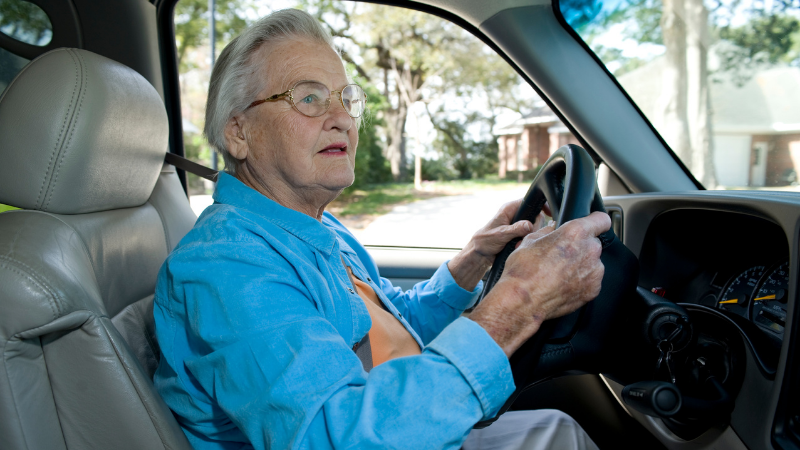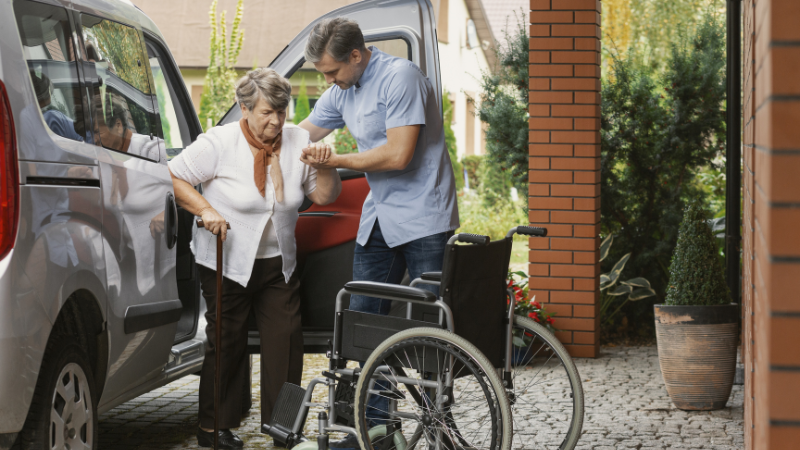Driving is a symbol of freedom for older Americans. Being mobile also keeps seniors socially active and independent. But aging drivers have a higher risk of being involved in accidents. Retesting seniors for their driver’s license is a potential solution for ensuring safety on the road.
According to the Centers for Disease Control, in 2020, nearly 48 million licensed drivers over the age of 65 were on the road. As seniors age, their risk for vehicle crashes, injuries, and fatalities increases. Traffic accidents cause several thousand older adults to die or become injured.

In 2020, approximately 7,500 seniors were killed in vehicle crashes. Car crashes sent 200,000 elderly individuals to the emergency room for treatment of their injuries. These startling statistics mean that 20 seniors are killed each day in car accidents and nearly 540 are injured.
Aging adults are more vulnerable to injury from a car accident, which explains their higher crash death rates. Seniors’ driving abilities are affected by age-related changes in vision, hearing, reflexes, memory, and the ability to reason. Medications and diseases also influence how they drive.
At What Age Do Most Seniors Stop Driving?
Drivers over the age of 70 have a significantly higher crash death rate than middle-aged drivers (35-54 years old). Families of aging adults wonder when it is best to take away the keys from their elderly loved ones. The answer is not straightforward, as several variables come into play.
The aging process affects each individual in a different way. Some seniors experience a decline in cognitive or physical functioning earlier than others. On the other hand, it is not uncommon for older adults in their eighties to feel confident in their ability to continue to drive.
However, experts warn that driving is unsafe for individuals over 85. Other circumstances that indicate a need to step away from the wheel are being unable to read traffic signals due to poor vision, side-swiping cars, tailgating, and forgetting to switch on the turn signal when changing lanes.
Being diagnosed with dementia should prompt a senior to stop driving. When an older adult frequently gets lost in familiar places, it’s a clear indicator that he should hand over the keys. A senior’s erratic driving may be noticed by concerned family and friends—another sign to stop driving.

How Do Families Deal with Elderly Parents Who Drive?
Driving represents independence, which is why many older people do not want to give up their keys. Families, however, may feel unsafe riding as a passenger in an elderly parent’s vehicle or when the senior drives around the grandchildren without them present.
These are telltale signs that adult children should start a discussion about their aging parents’ driving. Talk about concerns early—as soon as driving errors are noticed. Approach the conversations in a caring way by saying it’s understandable that age-related changes naturally affect driving ability.
Offer alternative options to driving, such as hiring an Uber or Lyft to get around town. Or, public transportation may be available. Communities may even offer senior ride services to places, like medical centers, senior centers, or shopping malls. Professional caregivers also provide transportation.
What are the Repercussions of Seniors Who Stop Driving?
Alternatives to driving are vital to a senior’s health. Older adults who lose their freedom and control in life by giving up driving are twice as likely to develop depressive symptoms. Depression can contribute to a further decline in cognitive abilities and physical functioning.
Aging people who stop driving reduce the size of their social networks by half. Without being able to visit friends and relatives, seniors are no longer as socially engaged and vibrant. A decline in social health is shown to affect elderly females more than aging men.
Another startling outcome of studies done on seniors who stop driving is their increased admittance rate to elder care facilities. Seniors who stop driving are five times more likely than current drivers to enter a nursing home, retirement home, or assisted living community.
All of the above considerations suggest that older adults’ driving abilities must be retested. Re-evaluating the driving skills of seniors can help families determine whether or not their elderly loved ones can continue to drive safely or must give up driving altogether.
Illinois mandates a road test for drivers aged 75 and over. Road tests are necessary when an elderly driver shows indications of driver impairment, such as from reports by a police official, a physician, or a family member. Vision tests and reaction tests should also be required to improve safety.
When families see the need to seek alternative transportation options for their elderly loved ones, consider the companion care services from Assisting Hands Home Care. As a home care agency, an important part of our responsibilities is to provide reliable transportation for aging care recipients.
Professional caregivers drive seniors to a range of places, such as senior centers, grocery stores, the post office, and doctors’ offices. We transport older adults to their group exercise classes and the local senior center. Our transportation services keep elderly individuals socially active and healthy.

Assisting Hands Home Care offers more than transportation services. Our caregivers also help seniors with the activities of daily living. We assist seniors with personal hygiene tasks, prepare meals, shop for groceries, provide medication reminders, perform light housekeeping, and evaluate the home for fall risks.
Our companion care services are highly valued by seniors and their families alike. Caregivers take the time to develop friendships with care recipients, taking them on safe outings, playing card games or assembling puzzles together, and joining them in enjoyable recreational pursuits.
The overall health of seniors is enhanced when they are supported by Assisting Hands Home Care. We help older adults continue their independence. When you need quality senior home care, trust our home care agency, like so many families in Matteson, Illinois, do. Call (872) 713-9707 today for an in-home consult.














